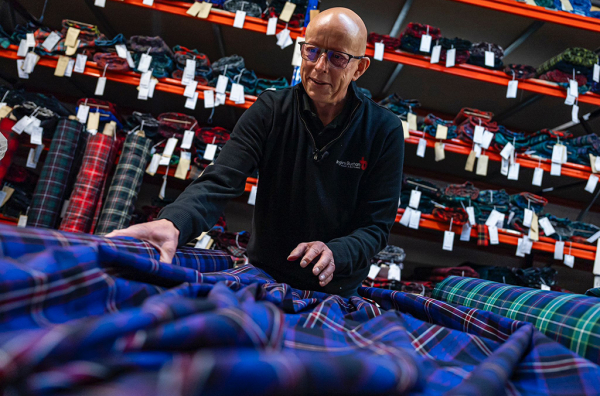GLASGOW, United Kingdom – A new tartan has been created for INTERPOL by one of the world’s leading tartan designers.
The traditional patterned cloth was commissioned by the United Kingdom, in advance of INTERPOL’s 92nd General Assembly which will be held in Glasgow from 4 to 7 November.
The General Assembly is INTERPOL’s supreme governing body, made up of representatives from each of its 196 member countries. It is the largest global gathering of senior law enforcement officials.

The INTERPOL tartan
The design was loosely based on the tartan of Scotland’s Black Watch Regiment, formed in 1739 to “Watch upon the braes", meaning “to guard the hills”. The infantry battalion was tasked with keeping the peace in the Scottish Highlands and was described by designer Brian Wilton MBE, also known as Scotland’s “Tartan Ambassador, as “a very worthy forerunner of today’s international police body”.
Colin Brown, Managing Director of Ingles Buchan which produced the INTERPOL tartan said:
“Tartan is woven into fabric of our nation. It is part of Scotland’s history.
“It is lovely to see tartan being used for an organization like INTERPOL, and this will be very unique for the delegates to have and to take back to their country as something with meaning to them.”
The bespoke tartan features the blue of INTERPOL interwoven with the colours of the UK flag. A wide navy-blue band comprised of 92 threads represents the 92 INTERPOL General Assemblies.
On either side of the navy band, are the threads of 7, 9, 19 and 23 signifying 7 September 1923, the precise date of the 1923 Congress which marked the foundation of INTERPOL.
The unique INTERPOL tartan has now been added to the official Scottish Register of Tartans in Edinburgh.
What is tartan?
Tartan is a design of coloured stripes woven to form a repeated textile pattern, usually consisting of two or more solid stripes running both horizontally and vertically in differing proportions, repeating in a defined sequence.
The roots of this famous chequered pattern, which has become synonymous with Scotland around the world, date back to the 3rd or 4th century.



